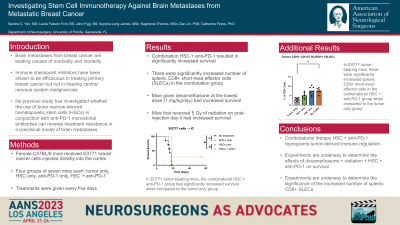Investigating Stem Cell Immunotherapy Against Brain Metastases from Metastatic Breast Cancer
Friday, April 21, 2023

.jpg)
Sandra C. Yan, MD
Neurosurgery Resident
University of Florida
Gainesville, Florida, United States
ePoster Presenter(s)
Introduction: Brain metastases from breast cancer are a leading cause of morbidity and mortality. Immune checkpoint inhibitors, including anti-PD-1 monoclonal antibodies, have been shown to be efficacious in treating primary breast cancer but not in treating CNS malignancies. Previous studies have shown that in murine models with CNS malignancies that are resistant to PD-1 blockade, the addition of bone marrow-derived hematopoietic stem and progenitor cells (HSCs) reverses treatment resistance. Additional work needs to be done to determine how the combination therapy impacts immune regulatory mechanisms, as well as to determine the effect of commonly used clinical treatments, such as steroids and radiation, on the safety and efficacy of the combination HSC + anti-PD-1.
Methods: There were four groups of seven mice each: tumor only, HSC only, anti-PD-1 only, and combination HSC + anti-PD-1. Female C57BL/6 mice received E0771 breast cancer cells injected directly into the cortex; five days later, the first treatment of HSC + anti-PD-1 was administered, with subsequent doses of anti-PD-1 injected every five days. When mice reached endpoint, spleens and lymph nodes were harvested. For survival studies, mice were given dexamethasone at doses of 0.01 mg/kg for three consecutive days; in separate experiments, mice were radiated at 5 Gy on post-injection day four.
Results: The combination group had significantly increased survival. There were significantly increased numbers of splenic CD8+ short-lived effector cells in the combination group when compared to tumor only. Mice given dexamethasone had increased survival, and mice that were radiated had significantly increased survival.
Conclusion : The combination HSC + anti-PD-1 reprograms tumor-derived immune regulation. To determine whether there is a difference in T cell functionality within groups, an experiment is currently underway to measure IFN-γ secretion of splenic T cells. Experiments are also underway to determine the effect of the combination of dexamethasone and radiation on survival of mice.
Methods: There were four groups of seven mice each: tumor only, HSC only, anti-PD-1 only, and combination HSC + anti-PD-1. Female C57BL/6 mice received E0771 breast cancer cells injected directly into the cortex; five days later, the first treatment of HSC + anti-PD-1 was administered, with subsequent doses of anti-PD-1 injected every five days. When mice reached endpoint, spleens and lymph nodes were harvested. For survival studies, mice were given dexamethasone at doses of 0.01 mg/kg for three consecutive days; in separate experiments, mice were radiated at 5 Gy on post-injection day four.
Results: The combination group had significantly increased survival. There were significantly increased numbers of splenic CD8+ short-lived effector cells in the combination group when compared to tumor only. Mice given dexamethasone had increased survival, and mice that were radiated had significantly increased survival.
Conclusion : The combination HSC + anti-PD-1 reprograms tumor-derived immune regulation. To determine whether there is a difference in T cell functionality within groups, an experiment is currently underway to measure IFN-γ secretion of splenic T cells. Experiments are also underway to determine the effect of the combination of dexamethasone and radiation on survival of mice.
